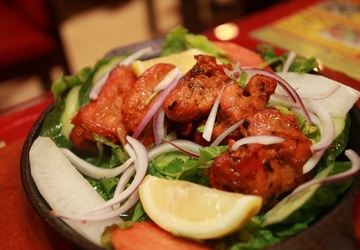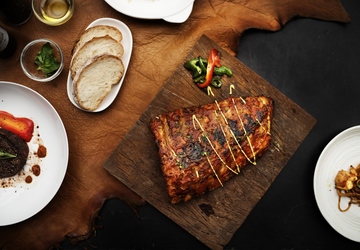In today's interconnected world, the realm of cooking is constantly transforming, weaving global flavors into local food. This fusion results in a lively, ever-evolving culinary mosaic. Traditional local dishes, once distinctive to certain areas, are now absorbing global elements, sparking a dynamic gastronomic exchange.
The Role of Cross-Cultural Interactions in Shaping Food

Food has long mirrored the interactions between cultures. Tracing back to the ancient Silk Road and extending to the current wave of globalization, the movement of populations has consistently spurred the mingling of culinary concepts. This cultural influence on cuisine is particularly noticeable in how regional recipes are adapting and assimilating foreign tastes, creating novel yet relatable flavors.
The Rise and Impact of Fusion Food Trends
Fusion food trends represent a modern culinary movement that transcends traditional culinary limits by merging disparate culinary styles. Originating in the latter part of the 20th century, this trend marries diverse culinary elements, fueled by a worldwide craving for novel and inventive flavors.
Expanding the Horizons of Local Flavors
Integrating global flavors into local food goes beyond just adding new ingredients. It involves reimagining cooking methods, presentation, and flavor combinations. Take, for example, the innovative approach of blending Asian stir-frying techniques with Mediterranean spices, leading to an exceptional taste fusion.
Likewise, fusion food trends frequently give rise to new culinary creations. The California Roll is a prime example, reinterpreting traditional Japanese sushi with American influences like avocado and crabmeat, showcasing how fusion cuisine can cultivate new, popular dishes.
Ethical and Sustainable Practices in Modern Cuisine
The process of infusing global flavors into local food also prompts discussions about sustainability and ethical sourcing. The quest for unique ingredients must be balanced with ecological and economic considerations to ensure responsible culinary evolution.
Technology’s Influence in Disseminating Food Trends
Digital platforms have significantly impacted the spread of fusion food trends. The use of social media, culinary blogs, and online cooking channels has simplified the sharing of recipes and food ideas globally, playing a crucial role in popularizing fusion cuisine and the infusion of global flavors into local food.
Migration's Impact on Culinary Diversity
The movement of people across nations significantly shapes the cultural influence on cuisine. Immigrants infuse their native culinary practices into their new environments, introducing innovative dishes and methods. This integration gradually leads to the birth of distinctive, blended culinary styles in local food scenes.
Exploration and Its Influence on Local Gastronomy
The act of traveling plays a pivotal role in infusing global flavors into local food. Globetrotters often bring back culinary inspirations from their journeys, attempting to replicate foreign dishes at home. This passion for culinary adventures has sparked a surge in the variety of cuisines available in local eateries and households.
Rise of Culinary Melting Pots in Urban Areas
Urban centers, known for their diverse populations, often serve as incubators for fusion food trends. In these cities, culinary professionals experiment with merging various food traditions, crafting inventive and sometimes surprising dishes that embody the flavors of several cultures.
The Role of Food Festivals
Food festivals around the world act as melting pots where global flavors and local food converge. These festivals are not just culinary events; they are cultural experiences, showcasing the rich tapestry of global culinary influence on local cuisines.
The Impact of Climate Change on Cuisine

As climate change affects global agriculture, it indirectly influences local cuisines around the world. Adapting to these changes, many chefs and food producers are finding innovative ways to integrate new, climate-resilient crops from different regions into local food practices.
Ethical Sourcing and Fair Trade
The demand for exotic ingredients from around the world has led to an increased focus on ethical sourcing and fair trade practices. This aspect ensures that the global influence on local cuisine is not only about taste but also about supporting sustainable and equitable food networks.
Fusion Cuisine in Fine Dining
Fine dining restaurants have become arenas where chefs showcase their innovative approaches to blending global flavors with local food. These establishments often lead the way in setting new fusion food trends, offering unique dining experiences that are a testament to the chef's creativity and cultural understanding.
Cooking Shows and Competitions
Cooking shows and culinary competitions on TV and online platforms have brought the concept of fusion cuisine into the mainstream. These shows often challenge contestants to create dishes that combine global flavors with local food, highlighting the creativity and versatility of chefs from various backgrounds.
The Intersection of Health and Global Cuisine
Wellness trends significantly influence contemporary cuisine. The growing awareness around health leads individuals to explore and integrate international foods and ingredients, renowned for their health benefits, into their everyday diets. This movement fosters an international exchange of not only flavors but also health-related food knowledge.
Addressing Critiques
Maintaining Culinary Heritage
The trend of integrating global flavors into local food has its advocates and detractors. Some culinary purists voice concerns that such trends could overshadow traditional cuisines, risking the loss of authentic culinary identities. Thus, striking a balance between innovation and the preservation of culinary heritage is a significant challenge in today's food culture.
Anticipating the Future of Cuisine
As we look to the future, the global influence on local cuisine is poised to continue reshaping our food experiences. The increasing interconnectedness of the world is reflected in our dining experiences, offering a glimpse into various cultures and tastes right from our kitchen tables.
The dynamic between global and local influences in cuisine is a fascinating aspect of cultural evolution. It highlights not just a blend of flavors but also an intertwining of cultural identities, enriching our understanding and appreciation of the world's diverse culinary heritage.
Conclusion
In essence, the global influence on local cuisine underscores the complex beauty of our world. By welcoming global flavors into local food, recognizing the cultural influence on cuisine, and keeping pace with fusion food trends, we can partake in a more inclusive and diverse culinary experience, one that honors and celebrates the rich variety of our global community.





